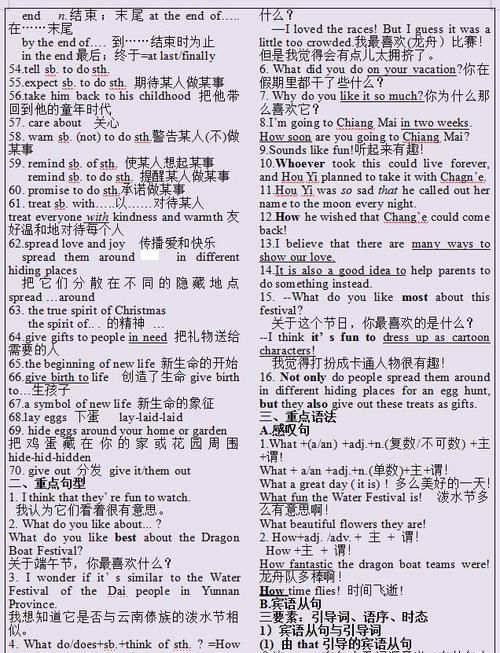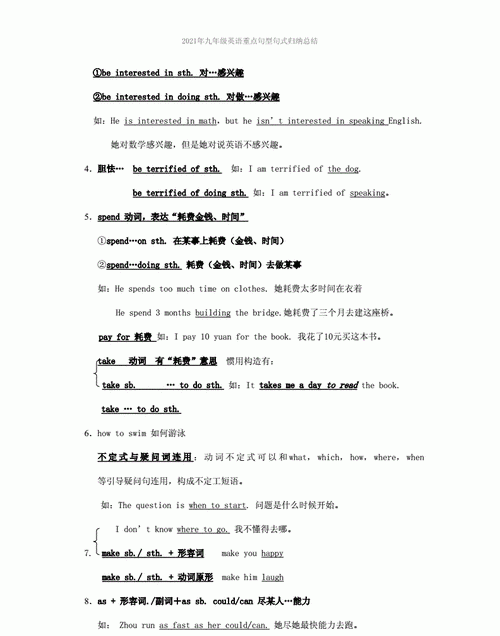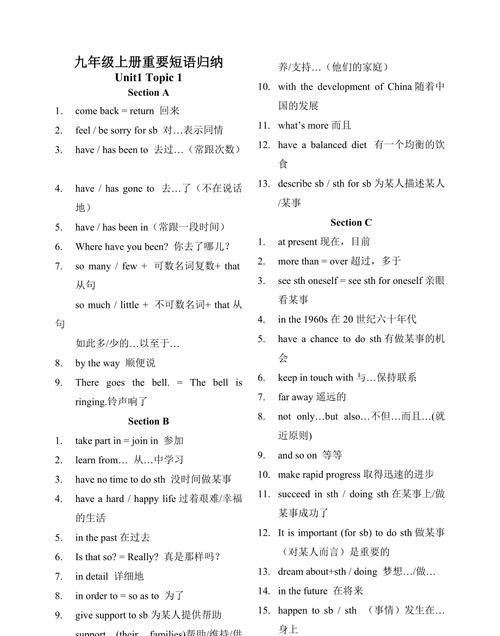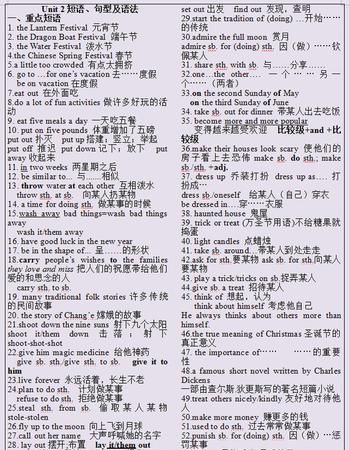本文目录
九年级上册英语重点句型翻译
九年级英语主要是定语从句,宾语从句,状语从句主句用将来时态从句用一般现在时,情态动词表虚拟,八个时态的主被动形式,祈使句的形式,相近词如:get to, arrive in,reach等的区别,短语动词如:put away,put off,put on,put down等的用法。

初中九年级英语语法大全
复合句:有主句,有从句。从句修饰主句的谓语,说明谓语发生的时间/地点/方式等等。
定语从句:也是复合句的一种,修饰主句中的某个名次/代词。
并列句:前后两个句子是相等的,没有主次之分,常用and/or/but/while等连接。
间接引语:把某人的话引用到自己的句中,不用引号表明,而是放在谓语动词的后面变成了宾语从句。如:she asked who you were.
直接引语:把某人的话引用到自己的句中,用引号表明,如; "Who are you?" she asked.
不定试: 是非谓语的一种, to do, 在句子中作除了谓语之外的所有成分。
九 年 级 英 语 语 法 集 中
——定语从句(the Attributive Clause)
Name: ______________ Class: ______________ No.:______________
一、定义:
在复合句中,修饰主句中的某一名词或代词的句子(从句)叫定语从句。定语从句所修饰的词叫先行词。定语从句作定语放在先行词的后面。
引导定语从句的词叫关系词,关系词有:关系代词that,which,who(宾格whom, 所有格whose)和关系副词when,where,why。关系代词或关系副词放在先行词和定语从句之间,既起连接作用,同时又作定语从句的一个成分。如:
The girl who is standing on the stage is my sister.
正站在台上的那个女孩是我的妹妹。(关系代词who在句中作主语)
I can’t find the book (that) I bought yesterday.
我找不到我昨天买的那本书。(关系代词that在句中作宾语,可省去)
Madam Curie was a great scientist whose name is known all over the world.
居里夫人是一位全世界闻名的伟大科学家。
二、用法:
(一)关系代词的用法:
(1)that指物,有时也指人,在从句中作主语或宾语。作主语不可省略,作宾语可省略。
which指物,不指人,在从句中作主语或宾语。作主语不可省略,作宾语可省略。如:
His father works in a factory that/ which makes TV set. (作主语,指物)
The coat (that/ which) I put on the desk is black. (作宾语,可省去)
The books (that/ which) they bought were written by me. (作宾语,可省去)
注意:
(一) which与that指物时可互相代替,但that比which更常见,尤其在口语中。但要注意that可用来指人,而which则不能指人。
只能用that不能用which引导的定语从句:
①定语从句所修饰的词,同时又被形容词最高级修饰时,定语从句只能用that引导;
This is the most interesting story (that) I have ever heard.
②定语从句所修饰的词,同时又被序数词修饰时,定语从句只能用that引导;
The children like the second Lesson that is about “The Football March”.
③定语从句所修饰的词,同时又被the only,the very或the same修饰时,
定语从句只能用that引导;
1) It is the only word (that) I know in the passage.
2) This is the same bicycle (that) I lost.
④定语从句修饰的词同时又被不定代词,如:all,any,no,every,little,many或much等修饰时,定语从句只能用that引导;
Here is all the money (that) I have.
⑤定语从句修饰词为everything,something,anything,nothing,all,none,much,little,few等不定代词时,定语从句只能用that引导。但something前有the时,定语从句可由which引出。
Here is something (that) I will tell you.
I want everything (that) I want.
⑥定语从句修饰的词中同时含有“人”和“物”的名词时,定语从句只能用that引导:
I can remember well the persons and some picture (that) I see in the room.
⑦定语从句修饰的词为one, ones时,定语从句用that引导:
Is it the one (that) you want?
⑧当主句的主语是疑问词 who或 which来提问时,为了避免重复,用that引导定语从句:]
Who is the girl that won the first place?
(二) who指人,that除指人外也指物,在从句中作主语或宾语。作宾语可省略,作主语不能省略。
1) The girl who often helps me with my English is from England. (作主语,不可省略)
2) The teacher who spoke at the meeting just now is having a rest in his office. (作主语,不可省略)
3) The boy (who/ that) I like isn’t here now. (作宾语,可省略)
注 意:
who与that指人时可互相代替,但下列情况只能用who不能用that引导的定语从句:
① 先行词是one,ones,anyone时,定语从句只能用who引导;
② 先行词为those时,定语从句只能用who引导;
③ There be句型开头。
另 注:(1) whom指人,为who的宾格形式,在句中只作宾语,其前没有介词时,也可用who替换使用,也可省略,如:
Who is the teacher (that/ who/ whom) Yanzhen is talking to? (作宾语,可省略)
Who is the teacher to whom Yanzhen is talking? (作宾语,介词to提到whom前,whom再此不可省略)
(2) whose 指人,也可指物,在从句中作定语,不可省略。如:
The building whose windows face to the south is our school. (作定语,不可省略)
(二)关系副词的用法:(略)
巩 固 练 习
一、用适当的关系代词填空:
1. The man ___________________ I saw in the street yesterday is Tom’s father.
2. The students ___________________ don’t work hard will not pass the exam.
3. Is there anything ___________________ you want to say now?
4. This is the only book ____________________ I want to read for my child.
5. The first present ____________________ my parents gave me was a model plane.
6. The bridge _____________________ is being built will be the most beautiful in the city.
7. I don’t want to work with a man ____________________ hair is so long.
8. These are the trees ____________________ were planted last year.
9. The car ____________________ he is using is made in China.
10. Is this the musician ____________________ you like best?
二、单项选择:
( )1. The girl _________________ could sing well went to Europe.
A. who B. whose C. whom D. which
( )2. We prefer music which _________________ great lyrics.
A. have B. has C. had D. is
( )3. She lives in a house __________________ windows face south.
A. that B. who C. which D. whose
( )4. Who is the man _________________ talked with you just now?
A. who B. that C. whom D. whose
( )5. Look at the boy and his dog _________________ are coming this way.
A. who B. which C. that D. whom
( )6. This is the biggest ship __________________ I’ve ever seen.
A. who B. whom C. that D. whose
( )7. Look at the girl __________________ name is Susan.
A. who B. whose C. whom D. that
( )8. That was all the money __________________ I had.
A. which B. that C. whom D. whose
( )9. This is the man __________________ last night.
A. whom I saw him B. whom I saw C. which I saw D. who I saw him
( )10. They talked about things and persons ______________ they remembered in the school.
A. who B. which C. that D. what
三、以下列画线的句子为定语,组成一个定语从句:
1. The boy is Tom. The boy is smiling.
_________________________________________________________________
2. The girl is Kate. She has a round face.
_________________________________________________________________
3. He is the man. I told you about him.
_________________________________________________________________
4. The man is kind. Everyone likes him.
_________________________________________________________________
5. The woman got the job. We saw her on the street.
_________________________________________________________________
6. He likes the novels. The novels were written by Hemingway.
_________________________________________________________________
四、阅读理解:
popular music in America is what every student likes. Students carry small radios and listen to music before class,after class,and at lunch. Students with cars buy large speakers and play the music loudly as they drive on the street.
Adult(成年人)drivers listen to music on the car radio as they drive to work. They also listen to the news about sports,the weather,and the life of American people. Most of the radio programmers are music.
Pop or popular music singers make much money. They make a CD or a tape which radio stations use in many places. Once the popular singer is heard all over the country,young people buy his or her tapes. Some of the money from these tapes goes to the singer. Wherever the singer goes,all the young people want to meet him or her. Now the singer has become a famous star.
There are other kinds of music that are important to Americans. One is called folk music. It tells stories about the common(普通的)life of Americans. Another is called western or country music. This was started by cowboys who would sing at night to the cows they were watching. Today,any music about country life and the love between a country boy and his girl is called western or country music.
36. _______kinds of music are mentioned in this passage?
A. Two B. Four C. Three D. Five
37. When pop singers _________,they will become famous stars.
A. make much money B. are loved by all over the young people
C. make a CD or a tape D. are wanted to sing on the radio
38. From the passage we know that country music is about the ______.
A. common life of Americans B. country life and love stories of cowboys
C. life of cowboys D. school life in America
39. Which of the following is true according to this passage?______.
A. All the students in America like popular music
B. Most of the radio programmers in America are popular music
C. Adult drivers in America listen to music all the time while driving
D. Everyone in America wants to meet pop singers wherever they go
40. What would be the best title(标题)for this passage?
A. Western Music B. Popular Music C. History of Music D. American Music

初三英语知识点
一、 定语从句
· 定语从句的定义
定语从句在句子中作定语,用来修饰一个名词、名词词组或者代词。
· 先行词和引导词
被修饰的名词、名词词组或代词叫做先行词;
在先行词和定语从句之间起连接作用的词叫做引导词。
引导词分为“关系代词”和“关系副词”。
· 关系代词和关系副词
关系代词有:who, whom, whose, that, which, as。
关系副词有:when, where, why。 注意:关系副词里面没有how。
如果要修饰方式,用that或in which引导,或者不用引导词。
I don’t like the way (that, in which) he eyed me.
我不喜欢他看我的那个样子。
· 关系代词:who
关系动词who在从句中主要作主语,在非正式语体里who还可以作从句中的宾语。
He is the man who wants to see you.
He is the man who I saw in the park yesterday.
· 关系代词:whom
He is the man (whom) I saw in the park yesterday.
(whom在从句中作宾语)
· 关系代词:whose
whose 用来指人或物,(只能用作定语, 若指物,它还可以同of which互换)。
They rushed over to help the man whose car had broken down.
Please pass me the book whose cover is green. (of which the cover/the cover of which)
· 关系代词:which(1)
which指物,在从句中作主语或宾语,作宾语时在非正式语体中可以省略。
They needed a plant which didn't need as much water as rice.
The farm (which) we visited yesterday is located in the suburb of Beijing.
· 关系代词:which(2)
当在which和that面前进行选择的情况下,一般情况下要选which:
1.在非限制性定语从句中通常用which作引导词,而不能用that做非限制性定语从句的引导词。
2. 修饰整个主句。
I never met Julia again after that, which was a pity.
3. 修饰谓语部分。
He can swim in the river, which I cannot.
4. 介词 + which
They are all questions to which there are no answers.
· 关系代词:that(1)
that多用来指物,有时也可以用来指人;在从句中作主语或宾语。指物的时候多用that,也可用which。
It’s a question that (which) needs careful consideration.
(指物,作主语。)
Who is the man that is reading a magazine under the tree?
(指人,作主语。)
The girl (that) we saw yesterday is Tom’s sister.
(指人,作宾语,可省略。)
· 关系代词:that(2)
在以下的情况中,只能用that作引导词,而不能用which作引导词。
1. 先行词为all , everything, anything, nothing, little等不定代词时。
All (that) she lacked was training.
2. 先行词被形容词最高级修饰时
This is the best film that I have ever seen.
3. 先行词被序数词和the last修饰时
4. 先行词中既有人又有物时
They talked about the teachers and the schools that they had visited.
5. 主句是含有who或which的特殊疑问句,为了避免重复时
二、 状语从句
1 地点状语从句
地点状语从句通常由where, wherever 引导。
Where I live there are plenty of trees.
Wherever I am I will be thinking of you.
2 方式状语从句
方式状语从句通常由as, (just) as…so…, as if, as though引导。
1) as, (just) as…so…引导的方式状语从句通常位于主句后,但在(just) as…so…结构中位于句首,这时as从句带有比喻的含义,意思是"正如…","就像",多用于正式文体,例如:
Always do to the others as you would be done by.
你希望人家怎样待你,你就要怎样待人。
As water is to fish, so air is to man.
我们离不开空气,犹如鱼儿离不开水。
Just as we sweep our rooms, so we should sweep backward ideas from our minds.
正如打扫房屋一样,我们也要扫除我们头脑中落后的东西。
2) as if, as though
两者的意义和用法相同,引出的状语从句谓语多用虚拟语气,表示与事实相反,有时也用陈述语气,表示所说情况是事实或实现的可能性较大。汉译常作"仿佛……似的","好像……似的",例如:
They completely ignore these facts as if (as though) they never existed.
他们完全忽略了这些事实,就仿佛它不存在似的。(与事实相反,谓语用虚拟语气。)
He looks as if (as though) he had been hit by lighting.
他那样子就像被雷击了似的。(与事实相反,谓语用虚拟语气。)
It looks as if the weather may pick up very soon.
看来天气很快就会好起来。(实现的可能性较大,谓语用陈述语气。)
说明:as if / as though也可以引导一个分词短语、不定式短语或无动词短语,例如:
He stared at me as if seeing me for first time.
他目不转睛地看着我,就像第一次看见我似的。
He cleared his throat as if to say something.
他清了清嗓子,像要说什么似的。
3 原因状语从句
比较:because, since, as和for
1) because语势最强,用来说明人所不知的原因,回答why提出的问题。当原因是显而易见的或已为人们所知,就用as或 since。
I didn't go, because I was afraid.
Since /As the weather is so bad, we have to delay our journey.
2) 由because引导的从句如果放在句末,且前面有逗 号,则可以用for来代替。但如果不是说明直接原因,而是多种情况加以推断,就只能用for。
He is absent today, because / for he is ill.
He must be ill, for he is absent today.
4 目的状语从句
表示目的状语的从句可以由that, so that, in order that, in case等词引导,例如:
You must speak louder so that /in order that you can be heard by all.
Better take more clothes in case the weather is cold.
5 结果状语从句
结果状语从句常由so… that 或 such…that引导,掌握这两个句型,首先要了解so 和 such与其后的词的搭配规律。
比较:so和 such
其规律由so与such的不同词性决定。such 是形容词,修饰名词或名词词组,so 是副词,只能修饰形容词或副词。 so 还可与表示数量的形容词many, few, much, little连用,形成固定搭配。
so foolish such a fool
so nice a flower such a nice flower
so many / few flowers such nice flowers
so much / little money. such rapid progress
so many people such a lot of people
( so many 已成固定搭配,a lot of 虽相当于 many,但 a lot of 为名词性的,只能用such搭配。)
so…that与such…that之间的转换既为 so与such之间的转换。
The boy is so young that he can't go to school.
He is such a young boy that he can't go to school
6 条件状语从句
连接词主要有 if, unless, as/so long as, on condition that 等。.
if 引导的条件句有真实条件句和非真实条件句两种。非真实条件句已在虚拟语气中阐述。
unless = if not.
Let's go out for a walk unless you are too tired.
If you are not too tied, let's go out for a walk.
7 让步状语从句
though, although
注意: 当有though, although时,后面的从句不能有but,但是 though 和yet可连用
Although it's raining, they are still working in the field.
3) ever if, even though. 即使
We'll make a trip even though the weather is bad.
4) whether…or- 不管……都
Whether you believe it or not, it is true.
5) "no matter +疑问词" 或"疑问词+后缀ever"
No matter what happened, he would not mind.
Whatever happened, he would not mind.
替换:no matter what = whatever
no matter who = whoever
no matter when = whenever
no matter where = wherever
no matter which = whichever
no matter how = however
注意:no matter 不能引导主语从句和宾语从句。
(错)No matter what you say is of no use now.
(对)Whatever you say is of no use now.
你现在说什么也没用了。(Whatever you say是主语从句)
(错)Prisoners have to eat no matter what they're given,
(对)Prisoners have to eat whatever they're given. 囚犯们只能给什么吃什么。
8 比较while, when, as
1)as, when 引导短暂性动作的动词。
Just as / Just when / When I stopped my car, a man came up to me.
2)当从句的动作发生于主句动作之前,只能用when 引导这个从句,不可用as 或 while。
When you have finished your work, you may have a rest.
3)从句表示"随时间推移"连词能用as,不用when 或while。
As the day went on, the weather got worse.
日子一天天过去,天气越变越坏。
9 比较until和till
此两个连词意义相同。肯定形式表示的意思是"做某事直至某时",动词必须是延续性的。否定形式表达的意思是"直至某时才做某事"。动词为延续性或非延续性都可 以。 正确使用这两个连词的关键之一就在于判断句中的动词该用肯定式还是否定式。
肯定句:
I slept until midnight. 我一直睡到半夜时醒了。
Wait till I call you. 等着我叫你。
(在肯定句中可用before代替 Let's get in the wheat before the sun sets.)
否定句:
She didn't arrive until 6 o'clock.
Don't get off the bus until it has stopped.
1)Until可用于句首,而till通常不用于句首。
Until you told me, I had heard nothing of what happened.
直到你告诉我以前,出了什么事我一点也不知道。
2)Until when 疑问句中,until要放在句首。
---Until when are you staying? 你呆到什么时候?
--- Until next Monday. 呆到下周一。
注意:否定句可用另外两种句式表示。
(1)Not until …在句首,主句用倒装。
Not until the early years of the 19th century did man know what heat is.
直到19 世纪初,人类才知道热能是什么。
Not until I began to work did I realize how much time I had wasted.
直到我开始工作,我才认识到了我已蹉跎了几多岁月。
(2) It is not until… that…
10 表示"一…就…"的结构
hardly/scarcely…when/before, no sooner…than 和as soon as都可以表示"一…就…"的意思,例:
I had hardly / scarcely got home when it began to rain.
I had no sooner got home than it began to rain.
As soon as I got home, it began to rain.
注意:如果hardly, scarcely 或no sooner置于句首,句子必须用倒装结构:
Hardly / Scarcely had I got home when it began to rain.
No sooner had I got home than it began to rain.
三、 名词性从句
1).宾语从句(The Object Clause);
· 宾语从句
在句子中起宾语作用的从句叫做宾语从句。宾语从句的引导词和主语从句的引导词相同。宾语从句可以作及物动词的宾语,作短语动词的宾语,介词的宾语。
· 宾语从句:及物动词
Everybody knows that money doesn't grow on trees.
· 宾语从句:短语动词
Please go and find out when the train will arrive.
· 宾语从句:介词的宾语
I am interested in what she is doing.
· 宾语从句:否定的转移
I don't suppose you're used to this diet.
我想你不习惯这种饮食。
I don't believe she'll arrive before 8.
我相信她8点之前不会到。
2).表语从句(The Predicative Clause);
· 表语从句
在句子中起表语作用的从句叫做表语从句。表语从句的引导词和主语从句的引导词相同。
What the police want to know is when you entered the room.
This is what we should do.
That's why I want you to work there.
as if, as though, because也可用来引导表语从句。
She seems as if she had done a great thing.
It is because you eat too much.
· 虚拟语气:表语从句
主语是idea, notion, proposal, suggestion, request等名词时,作表语从句的动词为原形动词或should+原形动词。
My suggestion is that we (should) go and help him.
Our only request is that this should be settled as soon as possible.
3).同位语从句(The Appositive Clause)。
· 同位从句一般跟在某些名词如answer(答案),hope(希望),fact(事实),belief (信仰),news(消息),idea(主意;观念),promise(承诺),information(信息),conclusion(结论),order(命令), suggestion(建议),problem(问题),thought (想法)等后面。例如:
I had no idea that you were here.
She told us her hope that she would become a pianist.
He made a promise that he would never come late.
· 同位语从句:whether
whether可以引导同位语从句,而定语从句不能用whether作为引导词。
He hasn’t made the decision whether he will go there.
I have small doubt whether he is suitable for the job.
· 同位语从句:what
what可以引导同位语从句,而定语从句不能用what作为引导词
I have no idea what he is doing now.
· 同位语从句:how
how可以引导同位语从句,而定语从句不能用how作为引导词
It’s a question how he did it.
· 同位语从句和定语从句的区别(1)
同位语从句和先行词是同等的关系;而定语从句是用来修饰先行词,是从属的关系。
· 同位语从句和定语从句的区别(2)
that在同位语从句中没有词义,不充当句子成分;而在定语从句中充当主语、宾语等句子成分。
· 同位语从句和定语从句的区别(3)
whether, what, how可以用来引导同位语从句;而它们不能用来引导定语从句。

新目标英语九年级学业水平测试
新目标九年级英语知识点汇总
九年级英语Unit1
1. by + doing 通过……方式 如:by studying with a group
by 还可以表示:“在…旁”、“靠近”、“在…期间”、“用、”
“经过”、“乘车”等
如:I live by the river. I have to go back by ten o’clock.
The thief entered the room by the window.
The student went to park by bus.
2. talk about 谈论,议论,讨论 如:The students often talk about movie after class. 学生们常常在课后讨论电影。
talk to sb. === talk with sb. 与某人说话
3. 提建议的句子:
①What/ how about +doing sth.?
如:What/ How about going shopping?
②Why don’t you + do sth.? 如:Why don’t you go shopping?
③Why not + do sth. ? 如:Why not go shopping?
④Let’s + do sth. 如: Let’s go shopping
⑤Shall we/ I + do sth.? 如:Shall we/ I go shopping?
4. a lot 许多 常用于句末 如:I eat a lot. 我吃了许多。
5. too…to 太…而不能 常用的句型 too+adj./adv. + to do sth.
如:I’m too tired to say anything. 我太累了,什么都不想说。
6. aloud, loud与loudly的用法
三个词都与"大声"或"响亮"有关。
①aloud是副词,重点在出声能让人听见,但声音不一定很大,
常用在读书或说话上。通常放在动词之后。aloud没有比较级
形式。如: He read the story aloud to his son.
他朗读那篇故事给他儿子听。
②loud可作形容词或副词。用作副词时,常与speak, talk,
laugh等动词连用,多用于比较级,须放在动词之后。如:
She told us to speak a little louder. 她让我们说大声一点。
③loudly是副词,与loud同义,有时两者可替换使用,但往往
含有令人讨厌或打扰别人的意思,可位于动词之前或之后。如:
He does not talk loudly or laugh loudly in public. 他不当众大声谈笑。
7. not …at all 一点也不 根本不 如:
I like milk very much. I don’t like coffee at all. 我非常喜欢牛奶。我一点也不喜欢咖啡。
not经常可以和助动词结合在一起,at all 则放在句尾
8. be / get excited about sth.=== be / get excited about doing sth.
=== be excited to do sth. 对…感兴奋 如:
I am / get excited about going to Beijing.===
I am excited to go to Beijing. 我对去北京感到兴奋。
9. ① end up doing sth 终止做某事,结束做某事 如:
The party ended up singing. 晚会以唱歌而结束。
② end up with sth. 以…结束 如:
The party ended up with her singing. 晚会以她的歌唱而告终。
10. first of all 首先
. to begin with 一开始
later on 后来、随
11. also 也、而且(用于肯定句)常在句子的中间
either 也(用于否定句)常在句末
too 也 (用于肯定句) 常在句末
12. make mistakes 犯错 如:I often make mistakes. 我经常犯错。
make a mistake 犯一个错误 如: I have made a mistake.
我已经犯了一个错误。
13. laugh at sb. 笑话;取笑(某人) 如:Don’t laugh at me!
不要取笑我!
14. take notes 做笔记,做记录
15. enjoy doing sth . 喜欢做…乐意做… 如:
She enjoys playing football. 她喜欢踢足球。
enjoy oneself 过得愉快 如:He enjoyed himself. 他过得愉快。
16. native speaker 说本族语的人
17. make up 组成、构成
18. one of +(the+ 形容词比较级)+名词复数形式 …其中之一
如: She is one of the most popular teachers.
她是最受欢迎的教师之一。
19. It’s +形容词+(for sb. ) to do sth. (对于某人来说)做某事…
如:It’s difficult (for me ) to study English.
对于我来说学习英语太难了。
句中的it 是形式主语,真正的主语是to study English
20. practice doing 练习做某事 如:
She often practice speaking English. 她经常练习说英语。
21. decide to do sth. 决定做某事 如:
LiLei has decided to go to BeiJing . 李雷已经决定去北京。
22. unless 假如不,除非 引导条件状语从句
如:You will fail unless you work hard..假如你不努力你会失败。
I won’t write unless he writes first. 除非他先写要不我不写
23. deal with 处理 如:I dealt with a lot of problem.
24. worry about sb./ sth. 担心某人/ 某事
如:Mother worried about his son just now.
妈妈刚才担心他的儿子。
25. be angry with sb. 对某人生气 如:
I was angry with her. 我对她生气。
26. perhaps === maybe 也许
27. go by (时间) 过去 如: Two years went by. 两年过去了。
28. see sb. / sth. doing 看见某人正在做某事 强调正在发生
see sb. / sth. do 看见某人在做某事 如:
如: She saw him drawing a picture in the classroom.
她看见他正在教室里画画。
29. each other 彼此
30. regard… as … 把…看作为…. 如:
The boys regarded Anna as a fool. 这些男孩把安娜看成傻瓜。
31. too many 许多 修饰可数名词 如:too many girls
too much 许多 修饰不可数名词 如:too much milk
much too 太 修饰形容词 如:much too beautiful
32. change… into… 将…变为…
如:The magician changed the pen into a book.
这个魔术师将这本书变为一本书。
33. with the help of sb. == with one’s help 在某人的帮助下
如:with the help of LiLei == with LiLei’s help
在李雷的帮助下
34. compare … to … 把…与…相比
如:Compare you to Anna, you are lucky.
你和安娜相比,你是幸运的。
35. instead 代替 用在句末,副词(字面上常不译出来)
instead of sth. / doing sth. 代替,而不是 用在句中,动词
如:Last summer I went to Beijing. This year I’m going to Shanghai instead.去年夏天我去北京, 今年我将要去上海。
I will go instead of you. 我将代替你去。
He stayed at home instead of going swimming.
他呆在家里而不是去游泳。

以上就是关于九年级英语句型归纳 ,九年级上册英语重点句型翻译的全部内容,以及九年级英语句型归纳 的相关内容,希望能够帮到您。

